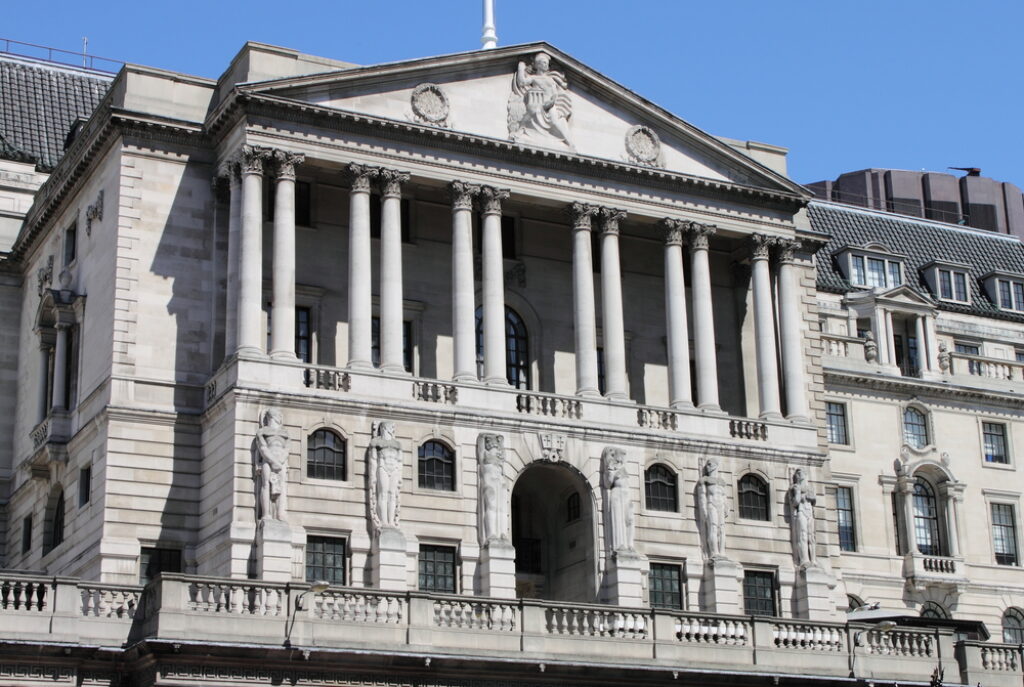The Bank of England has held the base rate at 5.25% for the second time in a row, as forecast by industry experts.
The Bank’s Monetary Policy Committee (MPC) voted by a 6-3 majority to maintain the base rate at 5.25%. Three members preferred to increase it by 0.25 percentage points to 5.5%.
The move was widely predicted, with experts now suggesting they may have peaked.
It follows on from inflation in the year to September recording a ‘sticky’ 6.7%, while the UK economy is estimated to have grown by 0.2% in August, resisting a technical recession once more.
Elsewhere, policymakers have had to contend with higher wage growth of 7.8% in the three months to August, meaning it now exceeds the rate of inflation.
The MPC noted that the market-implied path for the bank rate remains at 5.25% until Q3 2024 then declines gradually to 4.25% by the end of 2026, “a lower profile than underpinned the August projections”.
UK GDP is expected to have been flat in Q3 2023, weaker than projected in August, while the events in the Middle East have led the oil futures curve to rise, gas futures prices are little changed.
Elsewhere, the loosening labour market and the high pay growth figures are also being monitored closely. The committee noted: “There remains uncertainty about the near-term path of pay, but wage growth is nonetheless projected to decline in coming quarters from these elevated levels.”
Inflation is lower than earlier predictions, but remains well above the 2% target. However, it is expected to continue to fall sharply, to 4.75% in Q4 2023, 4.5% in Q1 2024 and 3.75% in Q2 2024.
“This decline is expected to be accounted for by lower energy, core goods and food price inflation and, beyond January, by some fall in services inflation,” the MPC wrote.
It added that inflation is expected to hit its 2% target by the end of 2025, falling to 1.6% in three years’ time.
What does this mean for borrowers and savers?
According to the latest figures from UK Finance (December 2022), an estimated 800,000 fixed rate mortgage deals (out of 6.8 million holders) are set to mature in the second half of this year. More than 770,000 borrowers are currently on their lender’s standard variable rate while 639,000 are on a variable tracker rate.
Chris Flower, chartered financial planner at Quilter, said: “For current and prospective homeowners, a further hold on interest rates will offer somewhat of a mixed bag. Those on variable rate mortgages will not see an immediate increase in their monthly payments, and the stability will provide further reprieve for borrowers – particularly those who may have been concerned about rising costs. The housing market is currently in a deep freeze and while a hold in rates is certainly not bad news, it’s probably not going to thaw it out any time soon.
“However, if rate stability helps people begin to feel more financially secure, then house prices may drop less quickly than first feared, as more competition helps to prop up prices.
“For those looking to remortgage or take out a new mortgage, lenders appear to be remaining very strict with their criteria. Though fixed rates have lowered slightly, new borrowers or those looking to switch may not yet see significant reductions, but things are beginning to move in the right direction. After all, lenders are commercial entities which compete for custom, so we may see price wars which could help to push rates down further in the coming months.”
Alastair Douglas, CEO of TotallyMoney, said some homeowners haven’t yet felt the brunt of the previous hikes, and “will be in for a shock when their fixed rate deal comes to an end”.
He said: “Mortgage defaults are already rising at the fastest pace since 2009, and if you’re struggling to keep up with payments, then get in touch with your lender as soon as possible. The Financial Conduct Authority has ordered banks to put their customers’ needs first, and this means you could move to reduced monthly payments, or extend the term of your deal.
“Remember that this won’t negatively impact your credit rating. However, missed payments can — and they could stay on your credit file for up to six years. If these persist, you might end up in mortgage arrears, leading to court action and even repossession.”
Savers may need to go quick
Meanwhile, savings expert and CEO of My Community Finance, Tobias Gruber, said: “The decision to hit the pause button on interest rate hikes means savers need to act fast to lock in those top rates for your savings – time is of the essence here. While the base rate stays put, it’s a golden opportunity for savers to boost their earnings, but you’ve got to make your move now.
“Compare your options among traditional banks, building societies, online banks, and credit unions. It’s just like searching for the best deal on car insurance – the same principle applies to your savings.
“Savings providers compete with each other, and when savers switch to get better rates, it spurs more competition and results in better rates for everyone. So, take control, ask more from your savings providers, and don’t miss out on this opportunity before the best deals vanish.”
For those with debt, Myron Jobson, senior personal finance analyst at Interactive Investor, said: “Common borrowing arrangements such as a personal loan or car financing won’t usually be affected by changes to interest rates because a fixed rate of interest is typically agreed before the loan is taken out. However, the rate of interest applied to credit cards and overdrafts could go up – even though they are not directly linked to the Bank of England base rate.
“Those with high levels of debt should consider what they can do now to reduce their debts as the cost of credit is rising just as the prices of everyday essentials are flying. It is worth consulting a debt advice charity such as StepChange or Turn2Us and they will go through all of your options.”
What it means for pension annuities
Helen Morrissey, head of retirement analysis at Hargreaves Lansdown, said: “We may not have experienced the crazy increases in annuity rates that we saw back in 2022 but they have been creeping up during 2023 and sit close to the levels seen in the aftermath of the mini Budget. After years in the doldrums, annuities are well and truly back in the spotlight and offering the best value in years which is great news for anyone in need of an element of guaranteed income in retirement. Today’s pause in interest rates as well as the elevated bond yields that we’ve seen should further support these higher rates.”

